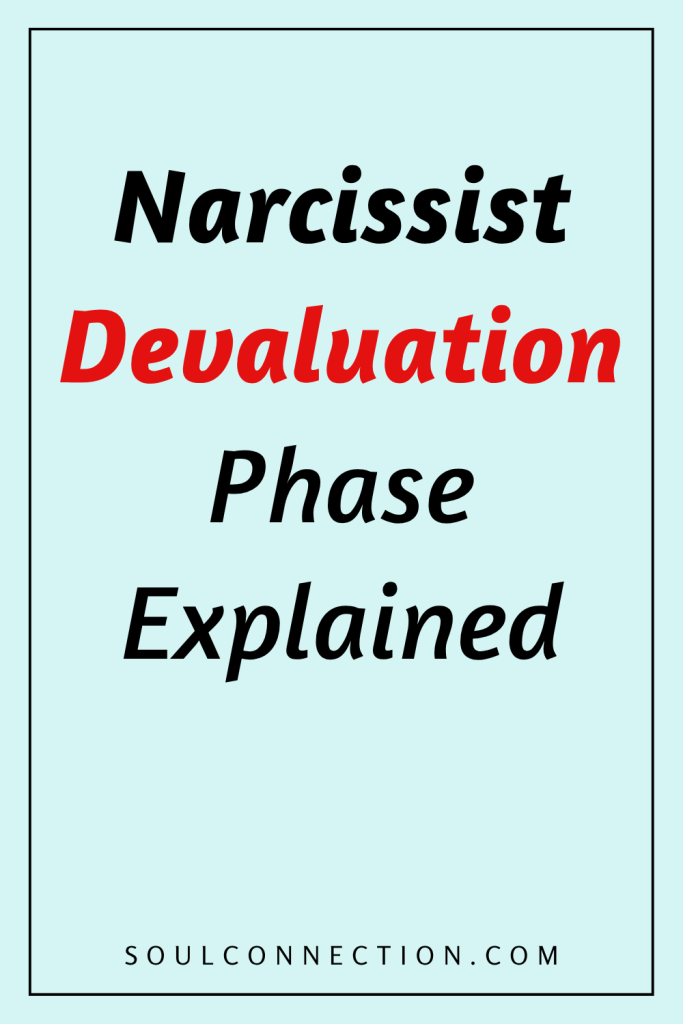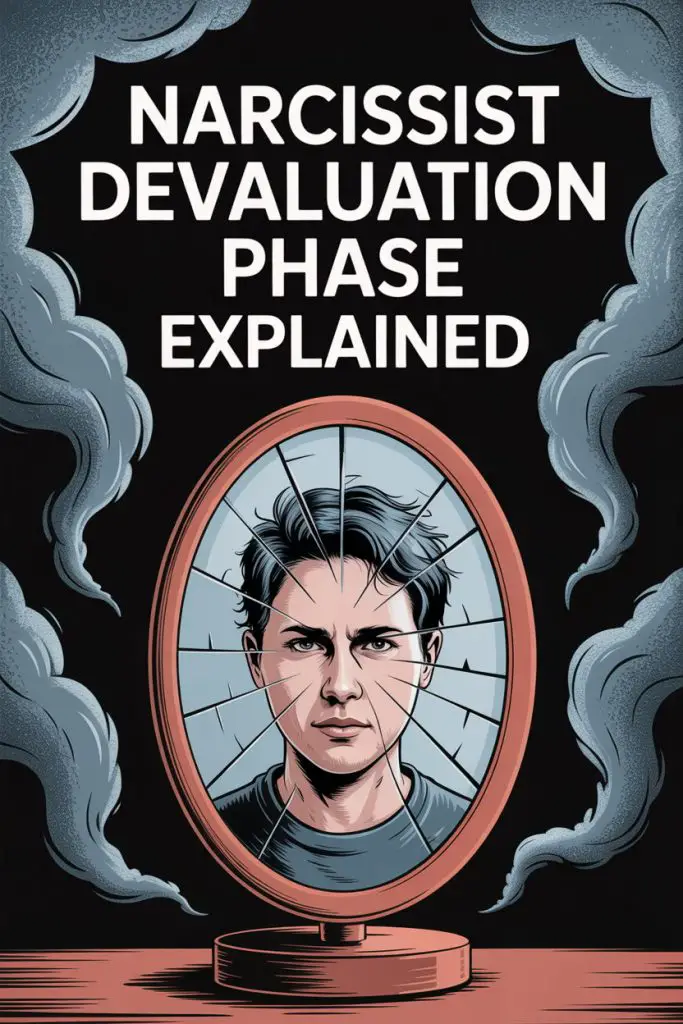There’s a moment in every relationship with a narcissist when you go from feeling like royalty to wondering if you’re actually the court jester. Welcome to the devaluation phase—where the magic carpet suddenly drops you off in a dustbin.
If you’re scratching your head, questioning your reality, and Googling “why is my partner suddenly treating me like leftover takeaway,” congratulations, you’ve found your people.
Let’s rip off the band-aid and get honest about why narcissists do this, what it feels like, and how you can keep your dignity intact (and maybe even get your sense of humor back).
What is the Devaluation Phase and Why Does It Happen?
Think of narcissistic relationships as a three-act play. Act one is “love bombing”—the honeymoon.
You’re amazing, you’re perfect, they want your Netflix password. Then, as predictably as British weather, the clouds roll in.
The devaluation phase begins when your shiny-new-partner high starts to wear off for the narcissist. They’re not actually interested in a real you; they want a mirror that reflects their own greatness.
The moment you show personality, needs, or—heaven forbid—a flaw, the pedestal they put you on starts to wobble.
The purpose? Control. Punishment for no longer being perfect. And, let’s not forget, a test to see if you’ll jump through more hoops for their occasional scraps of approval.
What Does Devaluation Look Like?
Some forms of devaluation come dressed in obvious red flags, others show up in subtle, sneaky ways. Spotting these signs early might just save you from having to invest in a stress ball factory.
- Criticism with a Side of Confusion
Suddenly, your quirks are “annoying,” your hobbies are “childish,” and the way you breathe is apparently a dealbreaker. It’s constructive criticism, they say. Sure. - Silent Treatment Olympics
There’s nothing like being ghosted by the person sitting next to you at dinner. Narcissists wield silence like a toddler wields mashed potato—messily, but with intent. - Triangulation Tricks
Now your narcissist is singing the praises of their ex, their new “friend,” or their imaginary secretary. The message? You don’t measure up. - Gaslighting Galore
The phrase “You’re too sensitive” earns a gold star in this phase. Suddenly, you’re overreacting, misremembering, or just plain crazy. - Withholding Affection as a Sport
Kisses, texts, compliments—all rationed out as if affection is a rare mineral.
Sensing a theme here? It’s all about making you question your worth, your reality, and sometimes your sanity.
Why the Sudden Switch?
If you’re expecting an apology or even an explanation, I hope you’re not holding your breath. The switch from “You’re my soulmate” to “You’re lucky I tolerate you” is as jarring as a cold shower, but there’s a method to the madness.
Narcissists often lack genuine empathy, and novelty is their addiction. When you stop being the shiny new toy, the hunt for fresh supply begins—sometimes with you, sometimes with someone else on the side.
Devaluing you allows them to justify their wandering attention and keep you chasing after the validation they once doled out like sweets at Halloween.
The Emotional Rollercoaster for the Target
The devaluation phase is less rollercoaster and more teacups-on-steroids. One moment, you’re aching for their approval; the next, you’re second-guessing your own memory and values.
Self-worth takes a nosedive. Anxiety spikes. Suddenly, you find yourself apologizing for things you didn’t do, or walking on eggshells just to keep the peace.
Sleep? What’s that. Appetite? Only if it’s for soul-searching.
Friends and family might notice a change in you, even if you’re convinced you’re just being “difficult” or “overly sensitive.” Spoiler: you’re not.
Common Tactics Narcissists Use in Devaluation
Narcissists aren’t exactly known for originality, so you’ll spot the same bag of tricks in most cases:
- Hot and Cold Behavior
Today you’re adored, tomorrow you’re an inconvenience. Emotional whiplash keeps you guessing. - Undermining Achievements
Land a new job? “Anyone could have done that.” Cook a nice meal? “A bit salty, don’t you think?” - Rewriting History
Arguments suddenly hinge on things you supposedly said or did, never mind your total lack of recollection. - Public Put-Downs
Jokes at your expense become the main event at family gatherings or nights out. Ha ha. Hilarious.
Each tactic chips away at your confidence, making you more reliant on the narcissist’s approval. It’s manipulation, plain and simple.
The Trap of Chasing Approval
Humans are wired to want acceptance, especially from people we care about. Narcissists know this, and boy, do they play it.
When crumbs of kindness follow a week of ice, you start rationing your own self-respect for the next hit of attention.
The most insidious part? After a while, you believe their opinion is the only one that counts. Cue a never-ending cycle of trying harder, doing better, losing yourself.
How to Respond Without Losing Your Mind
Easier said than done, but it’s not impossible. Here’s what helps:
- Recognize the Pattern
Name it. Call it out (in your own mind, or with trusted friends). The problem is not your “sensitivity”—it’s the manipulation. - Rebuild Boundaries
Narcissists hate boundaries the way cats hate baths. Stick to yours anyway. If you need space, take it—no apology necessary. - Resist Explaining or Defending
Every defense you offer is more ammunition for them. Keep explanations brief, or don’t explain at all. “I see it differently,” is a complete sentence. - Document Interactions
If gaslighting is on the menu, keeping notes or texts is surprisingly sanity-saving. Sometimes you need receipts (for your own peace of mind). - Reach Out for Support
Friends, family, a therapist, or even an online community—don’t let isolation be one more thing they take from you. - Prioritize Your Self-Care
Eat, sleep, move your body, do things that remind you who you are (outside the relationship). It’s not self-indulgence, it’s survival.
Can the Relationship Ever Get Better?
A question as old as time. If you’re hoping the narcissist will wake up one morning and realize their behavior is toxic, don’t bet the house on it.
Narcissists rarely change without significant therapy—and even then, insight is not guaranteed.
Relationships with narcissists often run on a cycle: idealization, devaluation, discard, Hoovering (when they suck you back in).
If you’re holding out for the “old them” to return, you’ll likely be waiting as long as it takes for pigs to sprout wings.
Instead, focus on your own standards. Do you feel respected? Safe? Cherished? If the answer is no, you’re allowed to want more.
Devaluation vs. Normal Relationship Ups and Downs
Every couple has rough patches. The difference? Normal arguments end with apologies, mutual understanding, and growth.
Narcissistic devaluation is about dominance and control, not resolving issues or building trust.
If your partner seems more interested in “winning” than connecting, and you’re starting to feel like a shadow of yourself, that’s your cue. Healthy love builds you up; narcissistic love grinds you down.
Escaping the Devaluation Trap
Leaving or distancing yourself from a narcissist isn’t a walk in the park—unless your idea of a walk includes landmines and emotional booby traps.
Expect pushback: guilt trips, Hoovering, even threats. They might suddenly promise the moon (spoiler: it’s still made of cheese).
Prepare your exit quietly, lean on your support network, and keep your eyes on the prize: your peace. You deserve relationships where your worth isn’t up for debate.
If staying is your choice, put non-negotiable boundaries in place and stick to them like superglue. If leaving, make safety—emotional and physical—your top priority.
Reclaiming Yourself After Devaluation
It’s normal to feel lost or broken after enduring this phase. Rebuilding self-esteem can feel like assembling Ikea furniture with no instructions and missing screws. Start small.
- Celebrate tiny wins (yes, even remembering to eat breakfast).
- Reconnect with people and passions that got sidelined.
- Remind yourself that love should not make you feel disposable.
Give yourself time. Healing from narcissistic devaluation isn’t a race—think marathon, not sprint.
Your Worth Is Not Negotiable
Surviving the devaluation phase is no small feat. It takes courage to see through the smoke, reclaim your voice, and put yourself back at the center of your own life.
Next time someone tries to sell you a magic carpet ride, check for hidden trapdoors. And never, ever let anyone convince you that you’re only as good as their approval.
You’re not a mirror, a prop, or a sidekick in someone else’s drama—you’re the whole show. Curtain up.


